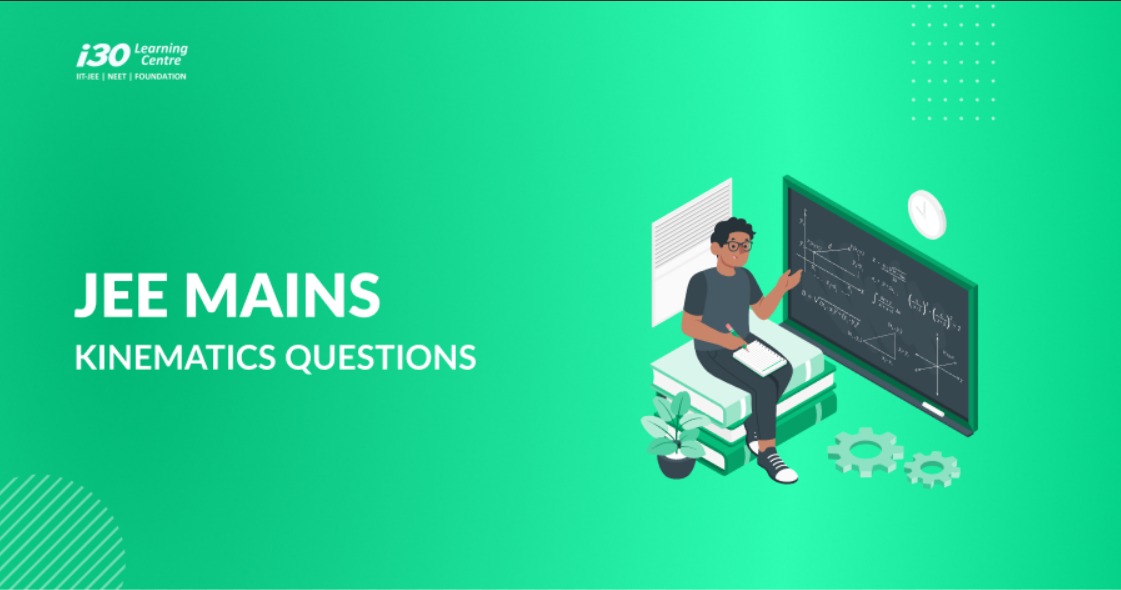The branch of physics that deals with the study of motion is known as kinematics. This branch of physics is very interesting and has questions associated with one-dimensional and two-dimensional motion. It is a very important topic in the JEE Main examination as well.
The kinematics JEE Mains questions are quite direct. With thorough practice, you can easily solve the questions in these sections. You can expect one or two questions in the upcoming JEE Main 2023.
Is Kinematics Important for JEE Mains?
Kinematics is a branch of physics that deals with the motion of objects. Everything around us is in motion, an object, a person moving from one point to another, cars, people, airplanes, the earth, the sun, the moon, and our galaxy. The important terms in this subject are displacement, velocity, acceleration, and time.
Kinematics is indeed a very interesting topic in JEE Main. It is the foundation of mechanics and has applications in many other topics. The chapter on kinematics may have one or two questions in the JEE Main exam. However, it is one of those chapters that shapes your foundation in physics.
The kinematics curriculum includes the following topics:
- Motion in a straight line.
- Frame of reference.
- Position- time graph.
- Speed and velocity.
- Uniform and non-uniform motion.
- Average speed and instantaneous velocity
- Velocity-time, position-time graph.
- Relations for uniformly accelerated motion.
- Scalars and Vectors.
- Vector. Addition and subtraction.
- Zero vector, scalar, and vector products.
- Unit Vector, Resolution of a Vector.
- Relative Velocity.
- Motion in a plane.
- Projectile Motion.
- Uniform Circular Motion.
How Can I Get Better at Kinematics?
Kinematics is one of the most important topics in physics. You will become familiar with this topic at the beginning of your JEE preparation. If you have a good understanding of them, then it will be quite easy for you.
- Speed, velocity, displacement, and accelerations are the topics that form your foundation in kinematics. You should have a solid conceptual understanding of these topics.
- You must be proficient in differentiation and integrations. These techniques will help solve numerical problems.
- Develop an understanding of graphs such as position vs time, velocity vs. time, and acceleration vs time.
- Practice a lot of one-dimensional motion practice questions. You should familiarize yourself with the various kinds of questions that are asked from one-dimensional motion.
- When you are confident with the concepts of motion in one dimension, start with vectors. Vectors are necessary to explain motion in two dimensions. Here, become familiar with vector algebra and its graphical representation. Practice a lot of numerals from vector algebra.
- You should now be able to apply the definitions of instantaneous velocity and acceleration learned in one-dimensional motion to two-dimensional motion, along with the 1D kinematic equations for constant acceleration.
- The next step is to study projectile motion.
- By the end of this unit, go through the concepts of relative velocity.
- Concepts of Physics by H.C. Verma has good explanations of kinematics. For numerical problems, Aptitude Test Problems in Physics by SS Krotov is good.
Pro Tip: Don’t study two topics together, start with one at a time. Once you are confident about that topic; then move to the next one.
FAQ: Kinematics JEE Mains Questions
How many questions come from kinematics in JEE Mains?
You can expect one or two questions from the kinematics section of JEE Main.
Can I skip kinematics?
No, you cannot skip kinematics for your JEE main exam. Kinematics is a very important and comparatively easy topic. It is a chapter that will shape your foundation in physics. The concepts of physics are interlinked. If you skip kinematics, the next chapters, like the laws of motion and rotational motion, will become very difficult.
Are kinematics tough?
The answer to this question depends on your approach. Kinematics is a fairly easy chapter compared to others. With conceptual understanding and practice, it will become very easy for you. However, if you don’t understand the basics or skip any topics, this might become difficult and can affect your understanding of the other topics too.
Can I skip rotational mechanics for JEE Mains?
You can expect easy to moderate-level questions in a rotational motion. Hence, we would recommend that you not skip rotational motion in JEE Mains.
Is kinematics important for mechanical engineering?
Yes, kinematics is a branch of mechanics. It deals with the motion of objects, and therefore it is very important for mechanical engineering. If you are interested in pursuing mechanical engineering, then a strong foundation in kinematics is crucial.
Wrapping Up
Kinematics is a very important topic in physics. In the upcoming JEE Main, you can expect one or two kinematics JEE Mains questions.
The importance of this subject in terms of the number of questions in JEE may be less. However, the concepts of this chapter will help you with the other important chapters in mechanics, like laws of motion and rotational motion. Kinematics will help you shape your foundation in physics. With practice and a thorough understanding of the concepts, you can excel in kinematics and the upcoming chapters.
Which is your favorite topic in the kinematics section? Let us know your strategy for kinematic preparation in the comments section.



